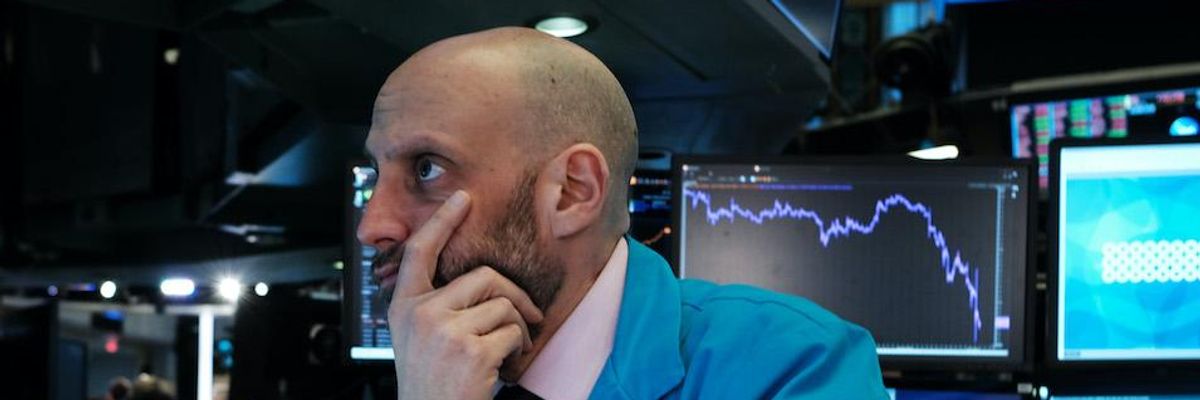U.S. stocks plunged again Monday on fears of a global economic slowdown on the heels of the coronavirus outbreak combined with an oil price war led to the Dow Jones Industrial Average losing 2,000 points at closing, its largest ever single day drop in points, as progressives called on the government to prioritize the interests of working people over the 1%.
"The folks who suffer most in a market crash are not the traders on Wall Street," said Rep. Ilhan Omar (D-Minn.). "It is ordinary people losing their jobs, getting their pay cut, or losing their pensions."
"Our focus should be on helping working people," Omar added.
The Dow's drop of 2,000 points was a decline of 7.79%; the S&P 500 fell 7.60% and the Nasdaq dropped by 7.29%.
Warning that the economic hit from the outbreak "will come fast" when it arrives and "hit lower-wage workers first and hardest," Josh Biven of the left-leaning Economic Policy Institute said it will be crucial for the government to introduce a swift and targeted response.
Biven called on the government to make a plan for "rapid direct payments to individuals" just as was done by President George W. Bush in 2008--when one-time checks of $600 for individual tax-filers and $1,200 for joint tax filers were issued--in order to stem the bleeding from the financial crash that year.
"We could use this model but do even better this time," said Biven, suggesting $1,000 for each individual and $500 per child.
"Besides needing money to tide them over when they can't work," he explained, "low-wage workers could also use protection against being let go by employers when they can't show up to work due to their sickness (or the sickness of family members)."
The decline evoked memories of the 2008 crash, according to the New York Times, as Monday's drop "was the worst for stocks in the United States since December 2008, when the country was still reeling from the collapse of Lehman Brothers and the housing crisis that dragged the economy into a recession."
"Markets want to hear that the global economy is open for business, and the problem is, it isn't easy to say that going forward," Silvercrest Asset Management chief strategist Patrick Chovanec told the Times.
As the Times reported:
Financial markets have whipped around for weeks as investors struggled to quantify the economic impact of the spreading coronavirus: stocks have tumbled, oil prices cratered, and yields on government bonds reflected a sense among investors that there was worse still to come.
The oil price war was triggered by announcements from Russia and Saudi Arabia that the two countries were about to launch into an oil production price war.
According to the Washington Post:
Oil prices tumbled into the $30s, after Saudi Arabia and Russia deadlocked over production. The Saudis had been pushing for a cut in output to prop up prices, but reversed course when Russia balked and decided, instead, to flood the market with hundreds of thousands of additional barrels per day--a move analysts fear may trigger a price war.
The oil price war is just making things worse, Janus Henderson Investors multiasset team head Paul O'Connor told MarketWatch.
"The coronavirus presents investors with an unprecedented global problem," said O'Connor. "Investors are uncertain about the nature of the virus, its potential economic impact, and the policy response. The oil shock has only added to this confusion and uncertainty."
President Donald Trump, who on Monday morning bemoaned the market declines as being the product of "fake news" from the media about the coronavirus and political attacks from Democrats, is under increasing pressure to take a stronger hand in dealing with the crisis. The White House on Monday held a roundtable discussion for the president and Wall Street CEOs to get a handle on the crisis and stimulate the economy.
News that the president spent time over the weekend golfing at his Mar-a-Lago resort did not impress economist Robert Reich, who tweeted that "not even a pandemic and a volatile stock market can get in the way of Trump's golf habit."




